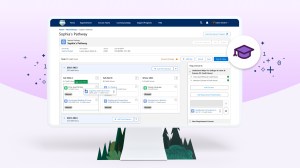Salesforce AI innovations will help give students a clear path to graduation, translate coursework into resume-ready skills, and match students and alumni to mentors
New generative AI capabilities will automate time-consuming tasks for faculty and staff, enabling them to focus on driving student success
Customers like the University of Nevada Las Vegas and Texas Tech will use Salesforce for Education to personalize student experiences and improve staff efficiency with AI
Today, Salesforce announced new AI-powered student success tools for Education Cloud, including Intelligent Degree Planning and Skills Generator, that will make it easier for institutions to help students map out personalized paths to graduation, translate coursework into resume-worthy experience, and engage in mentorship programs.
Salesforce also announced Data Cloud for Education and Einstein Copilot Recruitment & Admissions Actions, which will help institutions automate common tasks and improve recruitment, enrollment, and student support.
Why it matters: Education workers have the highest burnout rate of any industry, and students are feeling the effects – just 11% of college students believe they are prepared to join the workforce. As education barrels toward an enrollment cliff, confidence in the value of a college degree continues to wane, and educators leave their professions in high numbers, schools must find ways to help reduce staff workload and improve student experiences and outcomes.
AI innovation for lifelong student success: The new AI capabilities for Education Cloud, built on Salesforce’s Einstein 1 Platform, will help higher ed and K-12 institutions unlock their data to power trusted AI solutions that improve staff efficiency as well as student experiences and learning outcomes. The latest features include:
- Intelligent Degree Planning will help students and advisors build personalized degree plans, providing a roadmap to graduation and empowering them to take control of their education. Students will see progress they’ve made toward their degree in real time as they complete courses — as well as remaining requirements to graduate and ways to fulfill them. Additionally, with Pathway Templates, customizable degree plan guides, advisors can build tailored program plans for students to map out their coursework based on criteria like their major or concentration and how quickly they would like to graduate.
- Skills Generator will help faculty and staff design competency-based curriculum that improves workforce readiness. Using AI, the new tool analyzes program and course information to identify market-relevant skills students will gain, and then generates a list that can be added to coursework descriptions, making it simple for advisors and students to see what classes to take to gain specific skills and how those skills can be showcased on resumes.
- Einstein Mentorship Summaries will help institutions streamline management of mentoring programs. AI will summarize mentee needs and goals as well as the unique experiences and skills of available mentors so staff can pair students and alumni with the right mentor. For example, if a recent graduate wants to change their career path and is seeking a mentor to guide them, a program facilitator can search for and identify available mentors with the right experience to help the student reach the next phase of their career.
AI in action for faculty and staff: Salesforce is delivering new AI and data tools to automate time-consuming processes tied to recruitment, enrollment, and student experience. New features include:
- Data Cloud for Education will help institutions bring together data from different sources – such as student information and learning management systems – into a common model in Education Cloud. By harmonizing institutional data across multiple systems, staff no longer have to stitch data together to capture a full view of their students. They can also use this data to feed AI models to complete tasks that have historically been time-consuming and difficult, like predicting enrollment rates or identifying students who might be at risk of not graduating. Additionally, staff can use generative AI to summarize key trends and reveal insights like what events alumni are attending the most or what platforms donors prefer to engage with.
- Einstein Copilot Recruitment & Admissions Actions will use generative AI to provide informed answers to questions from prospective students. The conversational AI assistant helps staff quickly answer questions with precise responses that are grounded in previous student interactions, knowledge articles, events, and other institutional data. It also enables recruitment and admissions teams to determine which questions suggest a need for additional support. For example, if a prospective student reaches out about what types of courses are included in an institution’s business program, Einstein Copilot can generate a course summary that showcases why they should consider applying.
- Intelligent Question Generator for Student Intake will help staff better assess students’ needs by improving intake questionnaires, which have previously been manually intensive to prepare. This new AI tool will help craft smarter, more personalized questionnaires for advising, extracurriculars, and other student programs like study abroad and career services. Each questionnaire will be rooted in historical knowledge such as program descriptions so staff can match programs and services to students’ needs.
With industry-specific AI and data tools, Education Cloud will help K-12 and higher ed institutions provide more individualized support for every student while increasing efficiency and helping to reduce staff burnout.
Bala Subramanian, VP & GM of Education
The Salesforce perspective: “Every institution wants to provide the best possible experiences for their students and staff. With industry-specific AI and data tools, Education Cloud will help K-12 and higher ed institutions provide more individualized support for every student while increasing efficiency and helping to reduce staff burnout. This will free educators and staff to focus on improving student outcomes like career-readiness, well-being, and graduation rates.” — Bala Subramanian, VP & GM of Education
The customer perspective:
- “Salesforce technologies have already helped us deliver better student experiences, including an 80% reduction in student support wait times. With Education Cloud’s new AI tools, we’ll be able to provide even better, more personalized experiences that help our students thrive during their time on campus and after they enter the workforce.” — Kivanc Oner, CIO at the University of Nevada Las Vegas (UNLV)
- “With Salesforce, we have integrated our data, breaking down silos and allowing our faculty and staff to effectively act on it to improve student experiences. We now have a more connected, harmonized data system we trust accurately reflects our students. This data informs AI, leading to increased efficiency and more personalized support for our students.” — Mitzi Lauderdale, Vice Provost for Academic Innovation and Student Success at Texas Tech
Availability:
- Intelligent Degree Planning, Skills Generator, and Intelligent Question Generator will be generally available in June.
- Data Cloud for Education, Einstein Copilot: Recruitment & Admissions Actions, Einstein Mentorship Summaries, and Pathway Templates will be generally available in October.
Pricing:
- Access to Data Cloud, Einstein AI, and more is included with Einstein 1 Edition for Education, which will be generally available on June 18. They can also be purchased individually.
Learn more:
- Learn more about Education Cloud
- See how Texas Tech is increasing enrollment and graduation rates with Salesforce
- Watch here for key insights into the future of AI in education from Salesforce, UNLV, and Texas Tech
- Explore the Salesforce AI Playbook for Higher Education
- Review findings from the latest higher education trends report
Any unreleased services or features referenced here are not currently available and may not be delivered on time or at all. Customers should make their purchase decisions based upon features that are currently available.















